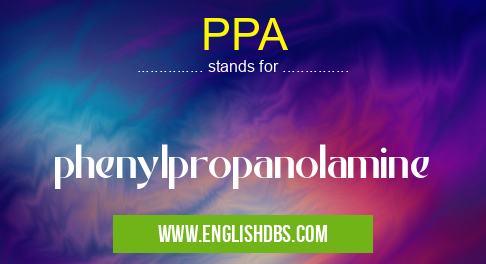What does PPA mean in CHEMISTRY
Phenylpropanolamine (PPA) is an amphetamine derivative that was widely used in over-the-counter drug products until the early 2000s. Phenylpropanolamine, or PPA for short, has both stimulant and decongestant effects; it is commonly used in cold medicines to reduce nasal congestion. The U.S. Food and Drug Administration (FDA) banned phenylpropanolamine from many popular cold and flu medications because of safety concerns about its use in certain individuals particularly in those who have a history of high blood pressure. Studies suggested that PPA may increase the risk of stroke when taken for a prolonged period of time or at high doses. Despite this, it continues to be available as an ingredient in some dietary supplements marketed for weight loss or improved athletic performance.

PPA meaning in Chemistry in Academic & Science
PPA mostly used in an acronym Chemistry in Category Academic & Science that means phenylpropanolamine
Shorthand: PPA,
Full Form: phenylpropanolamine
For more information of "phenylpropanolamine", see the section below.
What Does PPA Stand For
PPA stands for Phenylpropanolamine, which is an amphetamine derivative originally developed as a decongestant and stimulant medication. It was widely used in a variety of over-the-counter drugs until the early 2000s when concerns about its safety led to its eventual ban from many popular medications by the US Food and Drug Administration (FDA).
Essential Questions and Answers on phenylpropanolamine in "SCIENCE»CHEMISTRY"
What is phenylpropanolamine (PPA)?
Phenylpropanolamine (PPA) is a sympathomimetic amine commonly used in over-the-counter decongestant and appetite suppressant medications. It is also found in some prescription medications.
How does PPA work?
PPA acts as a stimulant, which means it can increase heart rate, blood pressure, alertness, and energy. It can also improve breathing by constricting blood vessels in the nasal and sinus passages.
What are the side effects of using PPA?
Side effects may include insomnia, irritability, headaches, dizziness, palpitations, dry mouth, nausea, and vomiting. Taking too much PPA can cause seizures or in rare cases stroke or heart attack.
Who should avoid taking PPA?
People with certain medical conditions such as high blood pressure or diabetes should avoid taking PPA. People who have had a heart attack within the last 6 months should also avoid taking this medication. Women who are pregnant or breastfeeding should not use PPA without consulting their doctor first.
Are there any drug interactions associated with PPA?
Yes, there are several drug interactions to be aware of when taking PPA including MAO inhibitors for depression; drugs that affect serotonin levels such as SSRIs and SNRIs; amphetamines; tricyclic antidepressants; and other stimulants such as caffeine and nicotine. Be sure to tell your doctor about all medications you take before starting on a course of PPA.
Final Words:
Although Phenylpropanolamine (PPA) has been banned from many over-the-counter medications due to safety concerns, it still remains available as an ingredient in some dietary supplements marketed for weight loss or improved athletic performance. As with any dietary supplement, it is important to consult with your healthcare provider prior to taking PPA supplements or any other product containing this ingredient.
PPA also stands for: |
|
| All stands for PPA |
